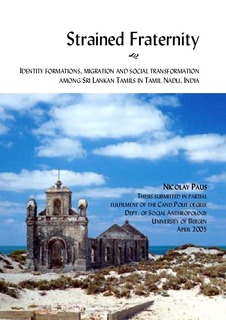Strained Fraternity. Identity Formations, Migration and Social Transformation among Sri Lankan Tamils in Tamil Nadu, India
Master thesis
Permanent lenke
http://hdl.handle.net/11250/2474505Utgivelsesdato
2005-01-01Metadata
Vis full innførselSamlinger
- Publications [1492]
Originalversjon
Thesis Submitted in Partial Fulfilment of the Cand.Polit. Degree in Social Anthropology. Bergen: University of Bergen. Department of Social Anthropology 255 p.Sammendrag
This dissertation deals with the situation of the Sri Lankan refugees who have fled to the Indian State of Tamil Nadu - primarily due to the escalating civil war. Their situation in India has been shaped by a series of socio-economic factors and political events, the most decisive one being the assassination of former Indian Prime Minister Rajiv Gandhi in 1991 by an LTTE (Liberation Tigers of Tamil Eelam) suicide bomber. This incident led to a permanent reversion of the Central- and Tamil Nadu Governments former pro-Tamil political approach on the Sri Lankan issue, and on the positive attitude towards the 200,000 or so Sri Lankan refugees. The study concentrates on the relationship that has developed between the local Indian Tamil population and the Sri Lankan refugees and migrants after the assassination of Rajiv Gandhi. It deals with the Sri Lankan Tamils' management of their daily life in India, and the construction and negotiation of identities, both between Indians and Sri Lankans as well as within the Sri Lankan Tamil community in India. For the Sri Lankans, the Indian social context represents a society which: firstly is poorer than that which they have left, secondly is culturally comparable to their own but nevertheless alien, and thirdly, the Sri Lankans in India are by and large considered a community of potential terrorists following the above-mentioned assassination. Following this disadvantageous external categorisation, the Sri Lankans are under constant surveillance and parts of this community have consequently been victims of extensive extortion and corruption. Furthermore, the thesis focuses on the socio-economic implications of the Sri Lankan diaspora and its effects on traditional caste, class and gender structures among the Sri Lankan exile population. The study further investigates the altered family structures of the Sri Lankan Tamils - born out of the war and the diaspora - and the economic and social implications of having close relati
